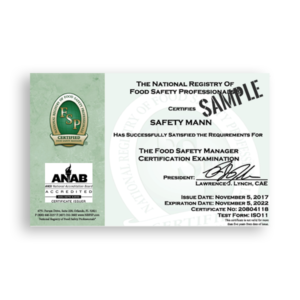How to Get Your Food Manager Qualification Rapidly
Getting your Food Supervisor Certification successfully requires a methodical approach, beginning with a detailed understanding of the particular needs in your area. Choosing an accredited training program that lines up with your timetable is crucial, as is using proper research study products to adequately get ready for the exam. After finishing your training, timely scheduling of the examination can protect against unneeded hold-ups. However, numerous individuals ignore critical aspects that can even more accelerate this procedure, which might substantially affect their qualification trip. Checking out these subtleties can eventually improve your path to certification.
Study Qualification Demands

Aspiring food managers must initially identify which accreditations are identified and requisite in their jurisdiction. This commonly entails evaluating regional regulations and regulations that determine food security practices and the certifications needed for supervisory positions. In addition, comprehending the qualification requirements, such as prior experience in food service or associated fields, is crucial.

Select an Effective Educating Program
Selecting the right training program is a crucial step after recognizing the certification needs in your area. The performance of your training can substantially influence your understanding of food security concepts, which are vital for passing the certification examination. Begin by looking into programs certified by trusted companies, such as the American National Criteria Institute (ANSI), as these commonly abide by market criteria.
Think about the training style that finest suits your understanding design. Alternatives include in-person classes, on-line courses, or a hybrid technique. On-line courses provide versatility, permitting you to research at your very own pace, while in-person sessions offer prompt communication with instructors and peers. Review the curriculum to guarantee it covers vital subjects such as foodborne illnesses, sanitation, and risk-free food managing practices.
Validate that the program includes detailed materials and sources to help in your knowing. By carefully picking a training program that lines up with your needs, you can enhance your prep work for the food manager certification examination.

Prepare for the Examination

Utilize research products that line up with the examination's framework. Numerous organizations provide study overviews and technique examinations, which can be vital in assessing your understanding and readiness. Engage in active knowing techniques, such as flashcards or seminar, to improve retention of crucial information.
Additionally, consider participating in evaluation programs or workshops that provide in-depth insurance coverage of crucial subjects. These sessions additional resources typically include specialist insights that can make clear complicated concepts and enhance your expertise.
Schedule Your Test Day
Choosing the correct time to schedule your test date is a vital step in the qualification procedure. Selecting a proper date permits you to allocate sufficient time for prep work while balancing various other personal and specialist commitments. Consider your existing workload and any kind of future occasions that may sidetrack you from focused research study.
Aim to arrange your test after finishing your preparatory coursework and method examinations. This ensures you feel great in your understanding and abilities. Additionally, take into consideration scheduling your examination for a day when you are typically at your most alert and concentrated, as psychological clarity can dramatically affect performance.
It is additionally smart to examine the availability of examination ports in your location, as some venues may have restricted openings. Arranging your exam well ahead of time can aid you secure a preferred time and place. Be conscious of the accreditation's expiry plans, as choosing a date too far in the future may lead to a lapse in your understanding.
Inevitably, the goal is to discover an equilibrium between readiness and accessibility, guaranteeing you approach your test with self-confidence and a strong structure of expertise.
Maintain Your Qualification
Maintaining your certification is important for making sure continuous proficiency and compliance in food administration practices. Certification usually needs renewal every 3 to 5 years, depending on the issuing organization. To stay current, it is essential to understand the details revival needs of your qualification body, as they might differ.
Continuing education and learning is a crucial component of preserving your certification (ServSafe Manager). Joining workshops, workshops, or on the internet courses associated with food health, administration, and safety and security methods not only boosts your knowledge yet may likewise accomplish renewal requirements. In addition, numerous qualification organizations provide sources and training sessions to help you stay educated regarding the most recent market why not try here criteria and regulations
Practicing excellent food management within your workplace is similarly important. Frequently using your understanding and abilities reinforces your proficiency and might supply documentation that demonstrates adherence to ideal techniques.
Lastly, track your accreditation's expiry day and any needed documents for the renewal procedure - Certified Food Manager Certification. Proactively taking care of these components will ensure that you keep your certification without interruption, enabling you to continue offering risk-free and efficient food monitoring in your specialist setting
Verdict
Achieving Food Supervisor Accreditation efficiently demands a calculated method that consists of complete research study of regional demands, selection of an ideal training program, and thorough preparation for the assessment. By adhering to these laid out steps, people can effectively browse the accreditation procedure and improve their specialist credentials in food monitoring.
The path to getting food manager qualification is not uniform; it differs significantly depending on local laws and the particular qualification program selected. The performance of your training can considerably affect your understanding of food safety principles, which are crucial for passing the certification test. By carefully selecting a training program that lines up with your demands, you can enhance your preparation for the food supervisor qualification exam.
Complete prep work is vital for success on the food supervisor certification examination.Accomplishing my company Food Supervisor Qualification efficiently requires a calculated method that consists of thorough research of regional demands, choice of an ideal training program, and attentive preparation for the evaluation.